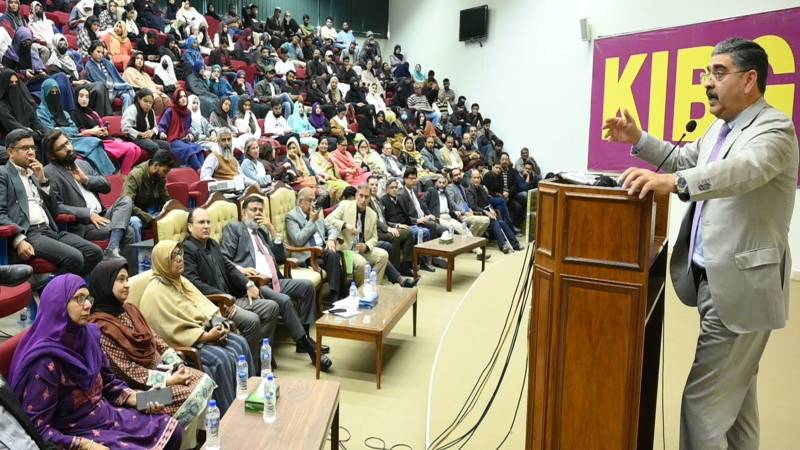
The former caretaker prime minister, Senator Anwaar-Ul-Haq Kakar, during his lecture aimed at promoting national unity and solidarity among the country's youth, emphasized the importance of fostering national unity and harmony while respecting our differences.
While addressing the students, faculty members, and deans at the Jinnah Auditorium of the Dr. A. Q. Khan Institute of Biotechnology and Genetic Engineering (KIBGE) at the University of Karachi on Tuesday, Kakar said, “We need to work together as a nation to tackle both internal and external challenges.”
The event was organized by the KU’s Students’ Advisor Office in collaboration with the Sindh Higher Education Commission.
He said, “Our questions should aim to understand, not to create confusion or to argue. Our youth is not lacking in talent and can be the catalyst for positive change in Pakistan. We have the right to critique and hold differing opinions based on facts, but we must avoid spreading negative propaganda without proper research and must change our perspectives.”
“The world is striving to benefit humanity through science and technology, especially artificial intelligence, while in our country, suicide bombers are still being prepared, which is a matter of serious concern.”
Senator Kakar further stated, “Even today, our country is taunted for losing a war, which reflects our sick mindset. Are we the only nation in the world to lose a war? Which nation in the world has never lost a war? Whoever fights a war will either win or lose. In Pakistan, some people, nonstate elements, and other forces want to shape the nation’s mental growth through mocking, while other nations that have lost wars do not engage in such taunting because they do not have sick minds.”
Referring to Hitler and the German Nazis, he said that their atrocities are no secret to anyone, yet German society does not mention them because they are a living people, while we are like vultures, doing nothing but taunting. In the past, millions of people in the West lost their lives in the name of nationalism, but no propaganda is made about it. “For the security, development, and welfare of the country, we need to promote a culture of debate, discussion, and tolerance and listen to others’ opinions despite our differences to become a peaceful society.”
Addressing the students, Anwaar-ul-Haq Kakar said that using abusive language or resorting to physical aggression is not a sign of critical thinking, but rather a clear example of rudeness and intolerance.
He mentioned that since his childhood, he has heard claims that Pakistan was artificially created and would not last for long, and such failed attempts to promote this narrative continue to this day. “We, as a nation, need to play a pivotal role in ending this narrative and must unite to completely eradicate this enemy discourse. Nothing is above the state, and we need to change our perspective by keeping the state’s interests in mind.”
He stated that no one can prevent you from thinking critically and conducting research, and a person can make a name for himself/herself in the field of research. “Youth is our asset and future and stressed that youth must act as a solid wall against internal and external conspirators.”
He observed that nonstate elements, religious and ethnic militancy, extremism, and other factors are directly harming the sovereignty of the country and hoped that youngsters could defeat these mindsets with unity and harmony as well as by getting a better education.
Senator Kakar mentioned that Pakistanis avoid paying taxes, but extortion is common throughout the country, and there are other examples that reflect that, as citizens, we are not fulfilling our responsibilities. At some stages, governments have also failed to perform their duties.
In response to a question, former acting PM Senator Anwaar-Ul-Haq Kakar stated that militants have social and political support. Their strategy is to confuse the rest of Pakistan and align them with their cause or gain their support. This is a battle of narratives, and it is essential for all of us, especially our younger generation, to defeat this narrative.
Earlier, the Chairperson of SHEC, Professor Dr. S. M. Tariq Rafi, shared that Pakistan, like many other developing nations, faces deep-rooted divisions—not just in its political system—but also within its social and cultural fabric, often stemming from ideological, ethnic, and religious differences, compounded by historical tensions and socio-economic inequalities.
“Differing opinions are natural, but they should not surpass our national interests, religion, and the integrity of the country. He expressed that we must be aware of our responsibilities and ensure their fulfillment,” he added.
He said that political polarization, if left unaddressed, can undermine national unity and destabilize the institutions that are supposed to serve the people. Yet, amid this turbulence, the youth of Pakistan possess the potential to bridge these divides and lead the country toward a more cohesive and stable future.
He mentioned that one of the most powerful ways that youth can contribute to resolving political polarization is through education. Education is not just about acquiring knowledge; it is about fostering critical thinking, empathy, and understanding of differing viewpoints.
“Universities, as the incubators of knowledge and innovation, play a pivotal role in shaping the minds of future leaders. By encouraging students to engage with diverse perspectives, universities can create environments where open dialogue and constructive debates replace entrenched divisions.”
On this occasion, the KU Vice Chancellor, Professor Dr. Khalid Mahmood Iraqi, emphasized promoting a culture of tolerance to bring reforms in society. He observed that people only want to hear what they have already decided. However, it is essential to engage in dialogue, discussion, listen, and read before drawing any conclusions. He stressed that there is a need to promote a culture of listening to others’ opinions and fostering tolerance.
He said that economic, social, political, and institutional reforms, along with the provision of human rights and adherence to the law, are indispensable for nation-building.

